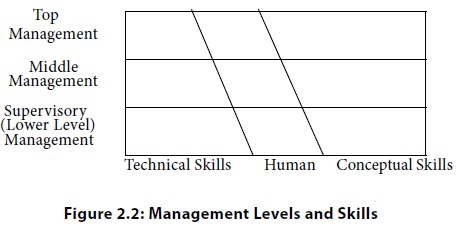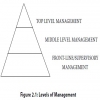Management Concepts & Organisational Behaviour - Levels In Management
Skills of Management
Posted On :
Management job is different from other jobs. It requires elements of stewardship and commitment to the purpose.
Managerial Skills
Management job is different from other jobs. It requires elements of stewardship and commitment to the purpose. It involves the obligation to make prudent use of human and material resources. It requires sound judgment to handle complex situations. Further, the nature of the job becomes increasingly complex at each higher level because of the increase in the scope of authority and responsibility. Therefore, each higher level requires increased knowledge, broader perspective and greater skills.
For the purpose of analysis, skills required of a manager are classified under three heads – technical, human (employee relations skill) and conceptual skills as shown in Figure 2.2. The exhibit helps in understanding the levels of management responsibility, the principal skill requirements, and the extent to which each kind of skill is required at each level.

Technical skills refer to the ability to use the tools, equipment, procedures, techniques and knowledge of a specialized field. It is primarily concerned with the ways of doing the things. It implies proficiency in a specific field of activity. Technical skills are most important for the lower level managers, because by nature their job involves supervision of the workers. Effective supervision and coordination of the work of the subordinates, therefore, depends on the technical skill possessed by the lower level manager. Any supervisor without a sound knowledge of the job cannot make an effective supervisor. Such supervisors are not respected by the subordinates at the shop floor. The relative importance of the technical skills as compared to the other skills diminishes as one move up to higher levels of management.
Human skills are primarily concerned with “persons” in contrast to “things”. When a manager is highly skilled in employee relations, he is aware of their attitudes, assumptions, and beliefs and recognizes their limitations as well as their usefulness. He accepts as an important fact of life, the existence of viewpoints and feelings, different from his own. Thus, human skills refer to the ability of the manager to work effectively as a group member and to build cooperative effort in the team he leads. It is the ability to work with, understand and motivate people. He understands why people behave as they do and is able to make his own behaviour understandable to them. He can foresee their reactions to possible courses of action. His skill in working with others is natural and continuous. He does not apply it in random or in inconsistent fashion. It is a natural ingredient of his every action. The flair for understanding, empathizing and working with people are central to the human skills.
Conceptual skills also called design and problem-solving skills involve the ability to:
1. see the organization and the various components of it as a whole;
2. understand how its various parts and functions are related in a network
fashion; and
3. to foresee how changes in any one of these may affect the others.
Conceptualskillsextendtovisualizingtherelationoftheorganization to industry, to the community and to the political, economic and social forces of the nation as a whole and even to forces which operate beyond the national boundaries. It is the creative force within the organization. A high degree of conceptual skill helps in analyzing the environment and in identifying the opportunities and threats. Managements of companies like ITC, Larsen & Toubro, Asian Paints, Bajaj Auto, Bharthi Telecom in the private sector and National Dairy Development Board, Bharat Heavy Electricals (BHEL) in the public sector, to mention a few, have amply demonstrated this skill in gaining a competitive edge over their competitors.
As you have understood by now – the three types of skills discussed so far are not mutually exclusive. In other words, management job always requires all the three skills, but in different proportions depending upon the level of management. There is a gradual shift in the emphasis from the bottom to the top of the pyramid. Technical skills and human skill are always in great demand at the lower level of management for it is there the productive processes and operations are carried out. It is there where you find most of the people. It is there where the action takes place. In contrast, the need for conceptual skill is greatest at the top level of management. Obviously, top managers are not often involved in the direct application of specific methods, procedures and techniques, compared to those at the lower echelons of management.
As evident from the foregoing discussion, at the entry level of the management job, that is, at the supervisory level, besides technical skills, a manager has to process human skills and the problem-solving skills (conceptual). To climb up the organizational ladder, one must not only be good at the skills required for the present job, but also learn and acquaint with the skills required at the next level. As result, in the event of promotion to the next higher levels, he/she would feel at home and discharge the responsibilities with ease.
Based on the differences in the type of skills required, organizations assess the training needs of the managers. Accordingly, appropriate training, development methods and programs are designed to equip them with the skills required at the respective levels. Although, each of these skills is needed in some degree at every level of management, there are successful executives who have no great amount of technical skills. But they are able to compensate the lack of that skill through superior creative ability and skill in identifying the talent and empowering the people through effective human resources development practices and good leadership.
Management job is different from other jobs. It requires elements of stewardship and commitment to the purpose. It involves the obligation to make prudent use of human and material resources. It requires sound judgment to handle complex situations. Further, the nature of the job becomes increasingly complex at each higher level because of the increase in the scope of authority and responsibility. Therefore, each higher level requires increased knowledge, broader perspective and greater skills.
For the purpose of analysis, skills required of a manager are classified under three heads – technical, human (employee relations skill) and conceptual skills as shown in Figure 2.2. The exhibit helps in understanding the levels of management responsibility, the principal skill requirements, and the extent to which each kind of skill is required at each level.

Technical Skills
Technical skills refer to the ability to use the tools, equipment, procedures, techniques and knowledge of a specialized field. It is primarily concerned with the ways of doing the things. It implies proficiency in a specific field of activity. Technical skills are most important for the lower level managers, because by nature their job involves supervision of the workers. Effective supervision and coordination of the work of the subordinates, therefore, depends on the technical skill possessed by the lower level manager. Any supervisor without a sound knowledge of the job cannot make an effective supervisor. Such supervisors are not respected by the subordinates at the shop floor. The relative importance of the technical skills as compared to the other skills diminishes as one move up to higher levels of management.
Human Skills
Human skills are primarily concerned with “persons” in contrast to “things”. When a manager is highly skilled in employee relations, he is aware of their attitudes, assumptions, and beliefs and recognizes their limitations as well as their usefulness. He accepts as an important fact of life, the existence of viewpoints and feelings, different from his own. Thus, human skills refer to the ability of the manager to work effectively as a group member and to build cooperative effort in the team he leads. It is the ability to work with, understand and motivate people. He understands why people behave as they do and is able to make his own behaviour understandable to them. He can foresee their reactions to possible courses of action. His skill in working with others is natural and continuous. He does not apply it in random or in inconsistent fashion. It is a natural ingredient of his every action. The flair for understanding, empathizing and working with people are central to the human skills.
Conceptual Skills
Conceptual skills also called design and problem-solving skills involve the ability to:
1. see the organization and the various components of it as a whole;
2. understand how its various parts and functions are related in a
3. to foresee how changes in any one of these may affect the others.
Conceptualskillsextendtovisualizingtherelationoftheorganization to industry, to the community and to the political, economic and social forces of the nation as a whole and even to forces which operate beyond the national boundaries. It is the creative force within the organization. A high degree of conceptual skill helps in analyzing the environment and in identifying the opportunities and threats. Managements of companies like ITC, Larsen & Toubro, Asian Paints, Bajaj Auto, Bharthi Telecom in the private sector and National Dairy Development Board, Bharat Heavy Electricals (BHEL) in the public sector, to mention a few, have amply demonstrated this skill in gaining a competitive edge over their competitors.
As you have understood by now – the three types of skills discussed so far are not mutually exclusive. In other words, management job always requires all the three skills, but in different proportions depending upon the level of management. There is a gradual shift in the emphasis from the bottom to the top of the pyramid. Technical skills and human skill are always in great demand at the lower level of management for it is there the productive processes and operations are carried out. It is there where you find most of the people. It is there where the action takes place. In contrast, the need for conceptual skill is greatest at the top level of management. Obviously, top managers are not often involved in the direct application of specific methods, procedures and techniques, compared to those at the lower echelons of management.
As evident from the foregoing discussion, at the entry level of the management job, that is, at the supervisory level, besides technical skills, a manager has to process human skills and the problem-solving skills (conceptual). To climb up the organizational ladder, one must not only be good at the skills required for the present job, but also learn and acquaint with the skills required at the next level. As result, in the event of promotion to the next higher levels, he/she would feel at home and discharge the responsibilities with ease.
Based on the differences in the type of skills required, organizations assess the training needs of the managers. Accordingly, appropriate training, development methods and programs are designed to equip them with the skills required at the respective levels. Although, each of these skills is needed in some degree at every level of management, there are successful executives who have no great amount of technical skills. But they are able to compensate the lack of that skill through superior creative ability and skill in identifying the talent and empowering the people through effective human resources development practices and good leadership.
Tags : Management Concepts & Organisational Behaviour - Levels In Management
Last 30 days 1153 views













